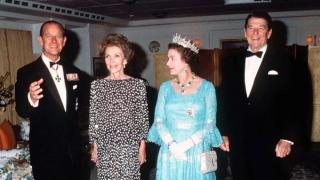The passing and farewell to His Royal Highness Prince Philip, Duke of Edinburgh, resonates much differently in the United States compared to Australia and the Commonwealth and provides an opportunity to reflect on America’s relationship with the United Kingdom and the monarchy.
The announcement of Prince Philip’s passing led the US newscasts on the day, but it is a life event that did not dominate the news cycle there as it has in Australia and throughout the Commonwealth.
As is to be expected. The Queen is not the head of state for the United States. The United States is not part of the Commonwealth. The friendship, alliance and affinity between the two countries is exceptionally deep; its modern iteration forged, as it was with Australia, in World War II and the defeat of fascism. As the musical Hamilton informs audiences today, America was the rebellious colony against King George III in 1776. But the absence of a hereditary leader of the American people has not impeded the flow of affection across the Atlantic of the “American cousins” in the New World. Nevertheless, hardly a president misses the chance to tweak a British leader with an historical note that the Redcoats burned the White House and the US Capitol in 1814 – which was the last violent assault on Congress until the Trump insurrection of January 6.
Hardly a president misses the chance to tweak a British leader with an historical note that the Redcoats burned the White House and the US Capitol in 1814 – which was the last violent assault on Congress until the Trump insurrection of January 6.
Americans still rebel against any president who has an “imperial” style, as was the case with Richard Nixon and the arrogance of power that led to his downfall.
Over the past four decades, the two countries have had political cycles that run in rough parallel. Margaret Thatcher became Prime Minister shortly before Ronald Reagan was elected president, and their mutual admiration and conservative theology meshed powerfully. Tony Blair and Bill Clinton overlapped, with both seeking to triangulate knotty economic and social issues with “Third Way” policies that bridged conservative and liberal politics. Blair took another turn with George W. Bush in the war with Iraq and was the American’s strongest ally in that campaign. And the historic vote in the United Kingdom on Brexit in 2016 was a precursor to the election of Donald Trump, whose nativism and hostility to global trading arrangements mirrored Brexit sentiment. Prime Minister Johnson and President Biden are not especially aligned in political philosophy and governance, but there appears to be a strong rapport on several issues including climate change. They will get along just fine.
The Queen has been an enduring presence throughout all these times, above the politics but always the embodiment of the binding ties between the two nations. The Queen and Prince Philip, as hosts of presidents at Buckingham Palace and guests at state dinners at the White House, have underscored, in both tangible and symbolic terms, the “special relationship” both nations claim with each other.
But in comparing the media wattage power of consorts, Prince Philip had much less of an impact in Washington or with Americans across the country than many First Ladies, such as Nancy Reagan, Hillary Clinton and Michelle Obama, did in London. No surprise there.
And only an American president could say, as US head of state Joe Biden did in honouring Philip’s long service and devotion, that Philip was “a heck of a guy.” And he really meant it.






